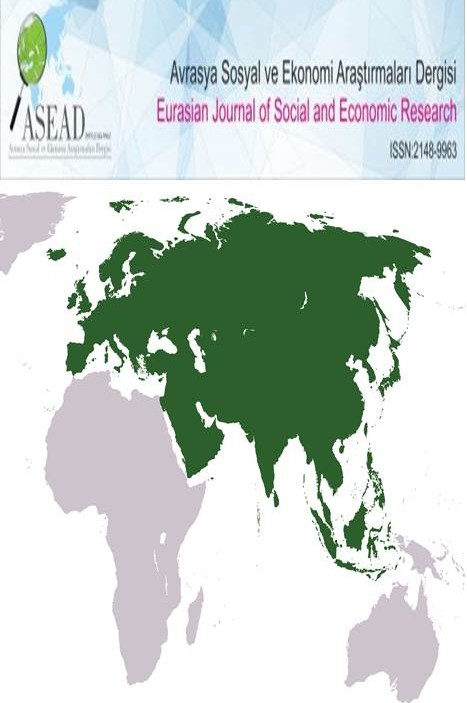FEMİNİST İKTİSAT: TOPLUMSAL CİNSİYET EŞİTLİĞİNE SEÇENEK BİR BAKIŞ
Feminist İktisat, Toplumsal Cinsiyet Eşitliği
FEMINIST ECONOMICS: AN ALTERNATIVE VIEW TO GENDER MAINSTREAMING
Feminist Economics, Gender Mainstreaming,
___
- Barker, Drucilla K. and Edith Kuiper (2003), “Introduction: Sketching the Contours of a Feminist Philiosophy of Economics”, in Toward a Feminist Philosophy of Economics, D.K. Barker and E.Kuiper (ed.), NY: Routledge, 1-17.
- Berik, G., Y. Rodgers and S. Seguino (2009), “Feminist Economics of Inequality, Development, and Growth”, 15(3), Feminist Economics, July, Routledge-Taylor&Francis Group, 1- 33.
- Bodkin, Ronald G. (1999), “Women’s Agency in Classical Economic Thought: Adam Smith, Harriet Taylor Mill, and J. S. Mill”, Feminist Economics, 5(1), Routledge-Taylor&Francis Group, 45-60.
- Brown, Cara L. (1998), “Sexual Orientation and Labor Economics”, Feminist Economics, 4(2), Routledge-Taylor&Francis Group, 89-95.
- Ding, S., X.Dong and S. Li (2009), “Women’s Employment and Family Income Inequality During China’s Economic Transition”, Feminist Economics, J15(3), July, Routledge- Taylor&Francis Group, 163-90.
- Ferber, Marianne A. and Julie A. Nelson (2003), “ Introduction: Beyond Economic Man, Ten Years Later” in Feminist Economics Today: Beyond Economic Man, Ed. M. A.Ferber and J. A. Nelson, University of Chicago Press, 1-24.
- Hooks, Bell (2002-ç), Feminizm Herkes İçindir, Çev. E. Aydın, vd., İstanbul: Çitlembik Yayınları.
- Kabeer, Naila (2004), “Globalization, Labor Standarts, and Women’s Rights: Dilemmas of Collective (In) Action In an Interdependent World”, Feminist Economics, 10(1), March, Routledge- Taylor&Francis Group, 3-35.
- KSGM - Kadının Statüsü Genel Müdürlüğü (2000a), Çalışma Yaşamında Cinsiyete Dayalı Ayrımcılık: Bankacılık Sektöründe Örnek Olay İncelemesi, (Proje Yön. S. Özdamar), Ocak.
- KSGM (2000b), Kadın İstihdamı İçin Yeni Perspektifler ve Kadın İşgücüne Muhtemel Talep, (Proje Yön. G. Günlük - Şenesen- E. Pulhan), Nisan.
- Matsui, Kathy, Hiromi Suziki and Yoko Ushio (1999), “Women-omics: Buy the Female Economy”, Goldman Sachs: Portfolio Strategy Report, August 13.
- Mellor, Mary (1992-ç), Sınırları Yıkmak: Feminist, Yeşil Bir Sosyalizme Doğru, Çev. O. Akınhay, İstanbul: Ayrıntı Yayınları.
- Özar, Şemsa (2004), “Kadınlar ve İktisat Bilimi”, Bianet-Bağımsız İletişim Ağı, 27 Mart http://bianet.org/ bianet/bianet/31610-kadinlar-ve-iktisat-bilimi (30.01.2010)
- Özkol, Sedat (2007), Dişil Yönetişim: İş-Çalışma-Hizmet Dünyasında Kadın Kalarak Başarılı Olmak, İstanbul: Resital Yayınevi.
- Purkayastha, Dipankar (1999), “Patriarchal Monopoly and Economic Development”, Feminist Economics, 5(2), Routledge-Taylor&Francis Group, 61-78.
- Rowbothom, Shelia (1984-ç), “Kadın Hareketi ve Sosyalizm İçin Örgütlenme”, iç. Feminizm, Sosyalizm ve Eylemde Birlik, (der: Rowbotham-Segal-Wainwright), çev. E.Ç.Özgül, İstanbul: İletişim Yayınları, 33-184.
- Russell, Bertrand (1983-ç), Evlilik ve Ahlak, Çev. V. Eranus, İstanbul: Say Yayıncılık.
- Ruwanpura, Kanchana N. (2009), “Book Critique: Gender, Generation and Poverty: Exploring the ‘Feminisation of Poverty’ in Africa, Asia and Latin America”, 15(1), Feminist Economics, Routledge-Taylor&Francis Group, January, 158-63.
- Serdaroğlu, Ufuk (1997), Feminist İktisat’ın Bakışı (Postmodernist mi?), İstanbul: Sarmal yayınevi.
- Serdaroğlu, Ufuk ve Nurcan Özkaplan (1998), “İktisat ve Toplumsal Cinsiyet (İktisatta Kadın Kimliği)”, iç. 20. Yüzyıl İçinde Kadınlar ve Gelecek, Ed. O. Çitçi, Ankara: TODAİE Yayını, 341-8.
- Strober, Myra H. (1994), “Rethinking Economics Through a Feminist Lens”, The American Economic Rewiev, Vol. 84/2, May, 143-7.
- Voyvoda, Ebru (2003), “Ev Ekonomisi ve Feminist İktisat”, Bağımsız Sosyal Bilimciler Derneği, www. bagimsizsosyalbilimciler.org (30.1.2010)
- World Bank Research Report (2001), Engendering Development: Through Gender Equality in Rights, Resources, and Voice, Washington: World Bank and Oxford University Press.
- Zacharias, Ajit and Melissa Mahoney (2009), “Do Gender Disparities in Employment Increase Profitability? Evidence From The United States”, 15(3), Feminist Economics, July, Routledge-Taylor&Francis Group, 133-61.
- Yayın Aralığı: Yılda 4 Sayı
- Başlangıç: 2014
- Yayıncı: İrfan TÜRKOĞLU
TURİZM SEKTÖRÜNDE TOPLUMSAL CİNSİYET ALGISI: BEŞ YILDIZLI OTEL ÇALIŞANLARI ÜZERİNE BİR ARAŞTIRMA
KÜLTÜR HAFTASI DERGİSİ VE 1930’LU YILLARIN KÜLTÜR POLİTİKASI
DİVANÜ LÛGATİ’T TÜRK VE HALK KÜLTÜRÜ
MÜLTECİ ÇOCUKLARIN AİLELERİNİN ALGILARINA GÖRE EĞİTİM SORUNLARI
Ahmet ÜSTÜN, Adem BAYAR, Erdoğan BOZKURT
İYİ BİR YÖNETİM Mİ? İYİ BİR YÖNETİCİ Mİ? İŞTE BÜTÜN MESELE BU: DENEYİMSEL BİR ÇALIŞMA
Sevtap Sarıoğlu UĞUR, Uğur UĞUR, Mustafa SOBA
MANAVGAT TİTREYENGÖL’DE YIL BOYUNCA İŞLETİLEN BİR OTELİN YÖNETİM STRATEJİSİ ÜZERİNE BİR ÇALIŞMA
VİDEO KLİPLERDE ZAMANIN VE MEKANIN SUNUMU: SİNEMAGRAF
MISIRLI KISA ÖYKÜ YAZARI FUÂD KANDÎL VE ERCÛ ELLÂ YEDÛME’Z-ZALÂM ÖYKÜSÜ
COMPARISON OF GLOBAL AND LOCAL CONSUMERS’ ATTITUDE TOWARD CAR AND RIDE SHARING SERVICES
